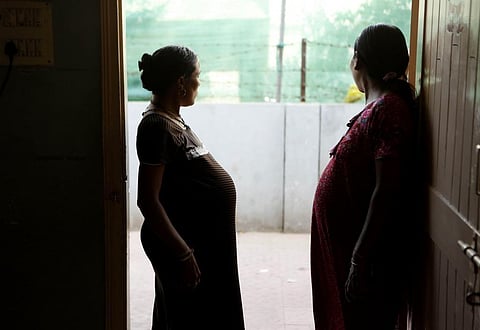

An estimated 12 million women in 115 countries lost access to family planning services due to disruptions caused by the novel coronavirus disease (COVID-19) pandemic, leading to 1.4 million unintended pregnancies, according to a new United Nations Population Fund (UNFPA) report.
Supply chain problems, mobility restrictions and fear of seeking health services contributed to this massive disruption for millions of women, said the UN sexual and reproductive health agency in the report published on March 11, 2021 in collaboration with Avenir Health, a global health organisation.
The number of unintended pregnancies could be as high as 2.7 million at the higher end of projections, or as low as 500,000 at the lower end of projections, said the report by UN sexual and reproductive health agency
These latest figures come as many countries, particularly high-income nations, show early signs of steeply declining birth rates. The impact of COVID-19 on access to health services has varied across countries and is ongoing.
The study was conducted in 115 low- and middle-income countries in January 2021. The projections showed that family planning services were largely disrupted in April and May of 2020.
An estimated 12 million women faced this disruption for a duration of 3.6 months on an average.
This number could be as high as 23 million on the higher end of projections, or as low as 4 million at the lower end of projections.
April 2020 estimates by the same partners had projected that 47 million women in 114 low- and middle-income countries would be unable to use modern contraceptives if the lockdowns or related disruptions continue for an average of 6 months. They had predicted it would result in seven million unintended pregnancies.
The unintended pregnancies have put a great strain on families, which were already struggling under pandemic-related financial burdens. They have also resulted in increased maternal morbidity and mortality, as well as rising numbers of unsafe abortions.
Acting swiftly
Fortunately, quick action has helped many health systems to maintain or restore essential health services, including contraceptives, said UNFPA.
UNFPA executive director, Natalia Kanem said:
"Despite major disruptions in access to family planning, the international community pulled together to mitigate the worst-case scenario. From governments to manufacturers to healthcare providers, the world’s supply chains for modern contraceptives have shown their resilience, and largely bounced back from the stock-outs we saw in the earlier days of the pandemic.”
The agency pointed out that even amid rising costs and supply chain constraints, it was able to procure and deliver contraceptives and other reproductive health supplies, as well as personal protective equipment for health workers.
Creative efforts, such as using a ride-hailing app to deliver contraceptives, SMS outreach and targeting family planning counselling to quarantine centres, also helped maintain or restore services. The short message service (SMS) programme is part of a partnership between UNFPA, the World Food Programme (WFP).